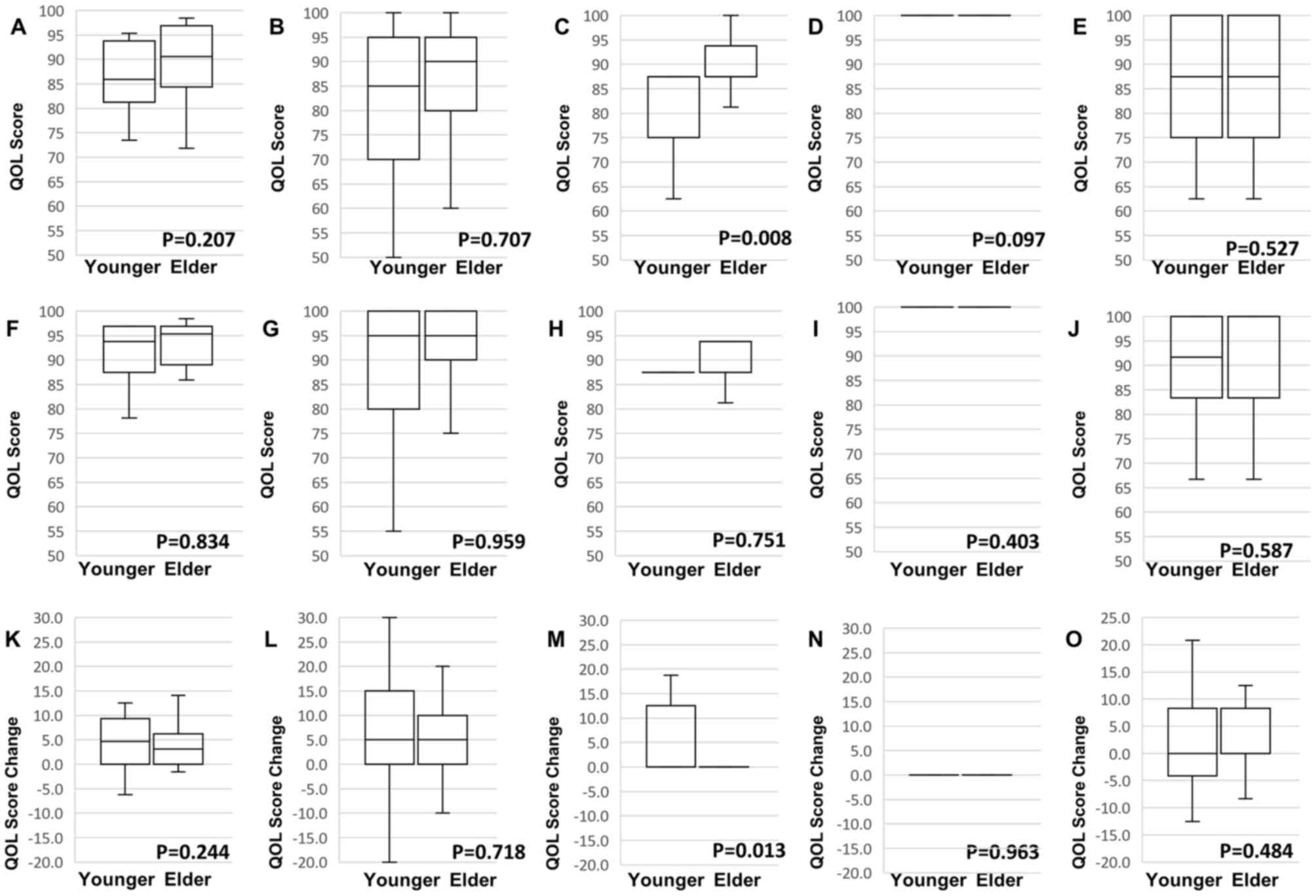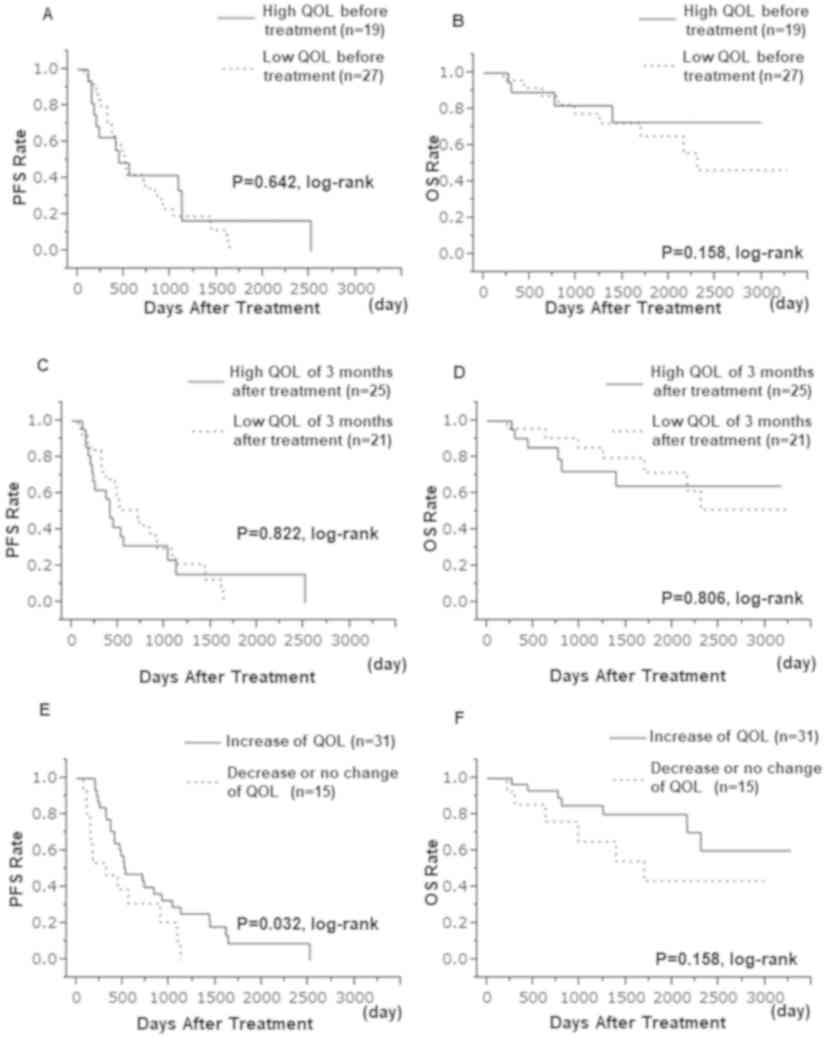|
1
|
Saracci R: The World Health Organisation
needs to reconsider its definition of health. BMJ. 314:1409–1410.
1997. View Article : Google Scholar : PubMed/NCBI
|
|
2
|
Maisey NR, Norman A, Watson M, Allen MJ,
Hill ME and Cunningham D: Baseline quality of life predicts
survival in patients with advanced colorectal cancer. Eur J Cancer.
38:1351–1357. 2002. View Article : Google Scholar : PubMed/NCBI
|
|
3
|
Kaasa S, Mastekaasa A and Lund E:
Prognostic factors for patients with inoperable non-small cell lung
cancer, limited disease. The importance of patients' subjective
experience of disease and psychosocial well-being. Radiother Oncol.
15:235–242. 1989. View Article : Google Scholar : PubMed/NCBI
|
|
4
|
Gotay CC, Kawamoto CT, Bottomley A and
Efficace F: The prognostic significance of patient-reported
outcomes in cancer clinical trials. J Clin Oncol. 26:1355–1363.
2008. View Article : Google Scholar : PubMed/NCBI
|
|
5
|
Dancey J, Zee B, Osoba D, Whitehead M, Lu
F, Kaizer L, Latreille J and Pater JL: Quality of life scores: An
independent prognostic variable in a general population of cancer
patients receiving chemotherapy. The National Cancer Institute of
Canada Clinical Trials Group. Qual Life Res. 6:151–158. 1997.
View Article : Google Scholar : PubMed/NCBI
|
|
6
|
Hortobagyi GN: Treatment of breast cancer.
N Engl J Med. 339:974–984. 1998. View Article : Google Scholar : PubMed/NCBI
|
|
7
|
McShane LM, Altman DG, Sauerbrei W, Taube
SE, Gion M and Clark GM; Statistics Subcommittee of the NCI-EORTC
Working Group on Cancer Diagnostics, : Reporting recommendations
for tumor marker prognostic studies (REMARK). J Natl Cancer Inst.
97:1180–1184. 2005. View Article : Google Scholar : PubMed/NCBI
|
|
8
|
Eisenhauer EA, Therasse P, Bogaerts J,
Schwartz LH, Sargent D, Ford R, Dancey J, Arbuck S, Gwyther S,
Mooney M, et al: New response evaluation criteria in solid tumours:
Revised RECIST guideline (version 1.1). Eur J Cancer. 45:228–247.
2009. View Article : Google Scholar : PubMed/NCBI
|
|
9
|
Kurihara M, Shimizu H, Tsuboi K, Kobayashi
K, Murakami M, Eguchi K and Shimozuma K: Development of quality of
life questionnaire in Japan: Quality of life assessment of cancer
patients receiving chemotherapy. Psychooncology. 8:355–363. 1999.
View Article : Google Scholar : PubMed/NCBI
|
|
10
|
Otsuka S, Watanabe N, Sasaki Y and
Shimojima R: Postoperative courses of breast reconstruction using
inferior adipofascial tissue repair. Breast Cancer. 22:570–577.
2015. View Article : Google Scholar : PubMed/NCBI
|
|
11
|
Crivellari D, Aapro M, Leonard R, von
Minckwitz G, Brain E, Goldhirsch A, Veronesi A and Muss H: Breast
cancer in the elderly. J Clin Oncol. 25:1882–1890. 2007. View Article : Google Scholar : PubMed/NCBI
|
|
12
|
Louwman WJ, Vulto JC, Verhoeven RH,
Nieuwenhuijzen GA, Coebergh JW and Voogd AC: Clinical epidemiology
of breast cancer in the elderly. Eur J Cancer. 43:2242–2252. 2007.
View Article : Google Scholar : PubMed/NCBI
|
|
13
|
Gennari R, Curigliano G, Rotmensz N,
Robertson C, Colleoni M, Zurrida S, Nolè F, de Braud F, Orlando L,
Leonardi MC, et al: Breast carcinoma in elderly women: Features of
disease presentation, choice of local and systemic treatments
compared with younger postmenopasual patients. Cancer.
101:1302–1310. 2004. View Article : Google Scholar : PubMed/NCBI
|
|
14
|
Wildiers H, Kunkler I, Biganzoli L,
Fracheboud J, Vlastos G, Bernard-Marty C, Hurria A, Extermann M,
Girre V, Brain E, et al: Management of breast cancer in elderly
individuals: Recommendations of the International Society of
Geriatric Oncology. Lancet Oncol. 8:1101–1115. 2007. View Article : Google Scholar : PubMed/NCBI
|
|
15
|
Shimozuma K, Sonoo H, Ichihara K and
Tanaka K: The prognostic value of quality-of-life scores:
Preliminary results of an analysis of patients with breast cancer.
Surg Today. 30:255–261. 2000. View Article : Google Scholar : PubMed/NCBI
|
|
16
|
Schou I, Ekeberg O, Sandvik L, Hjermstad
MJ and Ruland CM: Multiple predictors of health-related quality of
life in early stage breast cancer. Data from a year follow-up study
compared with the general population. Qual Life Res. 14:1813–1823.
2005. View Article : Google Scholar : PubMed/NCBI
|
|
17
|
Watters JM, Yau JC, O'Rourke K, Tomiak E
and Gertler SZ: Functional status is well maintained in older women
during adjuvant chemotherapy for breast cancer. Ann Oncol.
14:1744–1750. 2003. View Article : Google Scholar : PubMed/NCBI
|
|
18
|
Akin S, Can G, Durna Z and Aydiner A: The
quality of life and self-efficacy of Turkish breast cancer patients
undergoing chemotherapy. Eur J Oncol Nurs. 12:449–456. 2008.
View Article : Google Scholar : PubMed/NCBI
|
|
19
|
Hurwitz N: Predisposing factors in adverse
reactions to drugs. Br Med J. 1:536–539. 1969. View Article : Google Scholar : PubMed/NCBI
|
|
20
|
Cassidy J, Twelves C, Van Cutsem E, Hoff
P, Bajetta E, Boyer M, Bugat R, Burger U, Garin A, Graeven U, et
al: First-line oral capecitabine therapy in metastatic colorectal
cancer: A favorable safety profile compared with intravenous
5-fluorouracil/leucovorin. Ann Oncol. 13:566–575. 2002. View Article : Google Scholar : PubMed/NCBI
|
|
21
|
Levy M, Kewitz H, Altwein W, Hillebrand J
and Eliakim M: Hospital admissions due to adverse drug reactions: A
comparative study from Jerusalem and Berlin. Eur J Clin Pharmacol.
17:25–31. 1980. View Article : Google Scholar : PubMed/NCBI
|
|
22
|
Hurria A, Hurria A, Zuckerman E, Panageas
KS, Fornier M, D'Andrea G, Dang C, Moasser M, Robson M, Seidman A,
et al: A prospective, longitudinal study of the functional status
and quality of life of older patients with breast cancer receiving
adjuvant chemotherapy. J Am Geriatr Soc. 54:1119–1124. 2006.
View Article : Google Scholar : PubMed/NCBI
|
|
23
|
Mols F, Vingerhoets AJ, Coebergh JW and
van de Poll-Franse LV: Quality of life among long-term breast
cancer survivors: A systematic review. Eur J Cancer. 41:2613–2619.
2005. View Article : Google Scholar : PubMed/NCBI
|
|
24
|
Chee Chean D, Kuo Zang W, Lim M and
Zulkefle N: Health Related Quality of Life (HRQoL) among breast
cancer patients receiving chemotherapy in Hospital Melaka: Single
Centre Experience. Asian Pac J Cancer Prev. 17:5121–5126.
2016.PubMed/NCBI
|
|
25
|
Llombart-Cussac A, Pivot X, Biganzoli L,
Cortes-Funes H, Pritchard KI, Pierga JY, Smith I, Thomssen C, Srock
S, Sampayo M and Cortes J: A prognostic factor index for overall
survival in patients receiving first-line chemotherapy for
HER2-negative advanced breast cancer: An analysis of the ATHENA
trial. Breast. 23:656–662. 2014. View Article : Google Scholar : PubMed/NCBI
|
|
26
|
Dunphy FR, Spitzer G, Fornoff JE, Yau JC,
Huan SD, Dicke KA, Buzdar AU and Hortobagyi GN: Factors predicting
long-term survival for metastatic breast cancer patients treated
with high-dose chemotherapy and bone marrow support. Cancer.
73:2157–2167. 1994. View Article : Google Scholar : PubMed/NCBI
|
|
27
|
Tsuji W, Teramukai S, Ueno M, Toi M and
Inamoto T: Prognostic factors for survival after first recurrence
in breast cancer: A retrospective analysis of 252 recurrent cases
at a single institution. Breast Cancer. 21:86–95. 2014. View Article : Google Scholar : PubMed/NCBI
|
|
28
|
Coates A, Gebski V, Signorini D, Murray P,
McNeil D, Byrne M and Forbes JF: Prognostic value of
quality-of-life scores during chemotherapy for advanced breast
cancer. Australian New Zealand Breast Cancer Trials Group. J Clin
Oncol. 10:1833–1838. 1992. View Article : Google Scholar : PubMed/NCBI
|
|
29
|
Spiegel D, Bloom JR, Kraemer HC and
Gottheil E: Effect of psychosocial treatment on survival of
patients with metastatic breast cancer. Lancet. 2:888–891. 1989.
View Article : Google Scholar : PubMed/NCBI
|
|
30
|
Spiegel D, Sephton SE, Terr AI and Stites
DP: Effects of psychosocial treatment in prolonging cancer survival
may be mediated by neuroimmune pathways. Ann N Y Acad Sci.
840:674–683. 1998. View Article : Google Scholar : PubMed/NCBI
|
|
31
|
Kuchler T, Bestmann B, Rappat S,
Henne-Bruns D and Wood-Dauphinee S: Impact of psychotherapeutic
support for patients with gastrointestinal cancer undergoing
surgery: 10-year survival results of a randomized trial. J Clin
Oncol. 25:2702–2708. 2007. View Article : Google Scholar : PubMed/NCBI
|
















